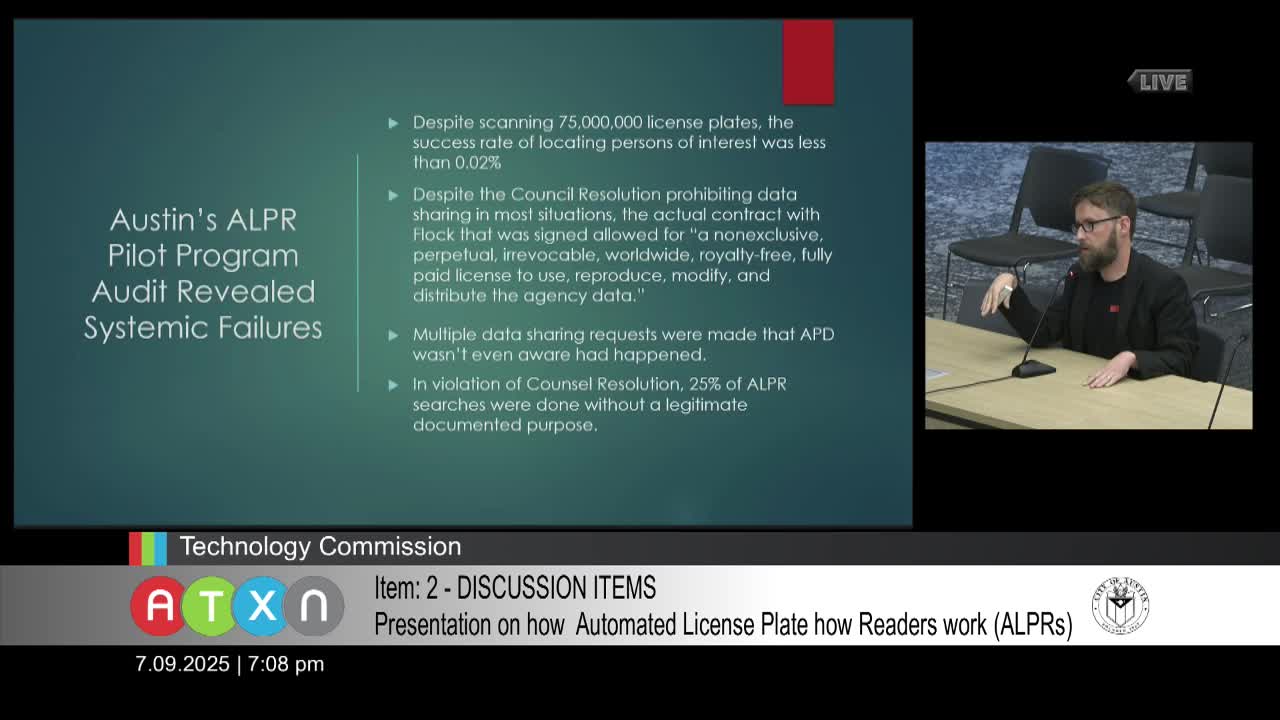Technology Commissioner highlights risks of ALPR misuse in Texas surveillance incidents
July 09, 2025 | Austin, Travis County, Texas
This article was created by AI summarizing key points discussed. AI makes mistakes, so for full details and context, please refer to the video of the full meeting. Please report any errors so we can fix them. Report an error »

The Austin Technology Commission meeting on July 9, 2025, focused on critical discussions surrounding the use of Automated License Plate Recognition (ALPR) technology and its implications for privacy and public safety. A significant concern raised was the alarming statistic that 25% of searches conducted using ALPRs lacked a legitimate documented purpose. This revelation prompted discussions about the potential for process failures within the Austin Police Department (APD) and the broader implications of such failures.
One commissioner, who identified as a software developer, acknowledged the inevitability of bugs in coding but emphasized the serious consequences of process failures, particularly when they lead to violence or loss of life. The commissioner argued that if the system cannot function correctly from the outset, it raises questions about its reliability in critical situations.
The meeting also highlighted a troubling report from 404 Media, which revealed that Texas authorities had conducted a nationwide search using over 83,000 ALPRs to track a woman who had undergone an abortion. This incident raised significant concerns about privacy and the potential for surveillance akin to authoritarian regimes. The commissioner expressed deep unease about the implications of such widespread monitoring, emphasizing the fear it instills in citizens.
Additionally, the meeting addressed a recent incident in Dallas where bounty hunters utilized ALPR data to locate a target, resulting in a fatal shootout. This case underscored the risks associated with private access to sensitive data, which is often available to entities beyond law enforcement.
The discussions at the meeting underscored the urgent need for a reevaluation of ALPR technology's use and the policies governing its implementation. As the commission continues to explore these issues, the potential for misuse and the impact on civil liberties remain at the forefront of their agenda.
One commissioner, who identified as a software developer, acknowledged the inevitability of bugs in coding but emphasized the serious consequences of process failures, particularly when they lead to violence or loss of life. The commissioner argued that if the system cannot function correctly from the outset, it raises questions about its reliability in critical situations.
The meeting also highlighted a troubling report from 404 Media, which revealed that Texas authorities had conducted a nationwide search using over 83,000 ALPRs to track a woman who had undergone an abortion. This incident raised significant concerns about privacy and the potential for surveillance akin to authoritarian regimes. The commissioner expressed deep unease about the implications of such widespread monitoring, emphasizing the fear it instills in citizens.
Additionally, the meeting addressed a recent incident in Dallas where bounty hunters utilized ALPR data to locate a target, resulting in a fatal shootout. This case underscored the risks associated with private access to sensitive data, which is often available to entities beyond law enforcement.
The discussions at the meeting underscored the urgent need for a reevaluation of ALPR technology's use and the policies governing its implementation. As the commission continues to explore these issues, the potential for misuse and the impact on civil liberties remain at the forefront of their agenda.
View full meeting
This article is based on a recent meeting—watch the full video and explore the complete transcript for deeper insights into the discussion.
View full meeting
